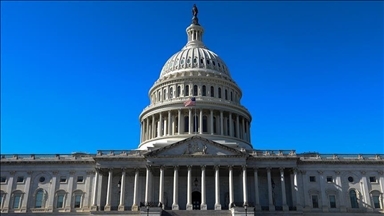 File Photo - Supporters hold US President Donald Trump cardboards during a "Save America Rally" near the White House in Washington, D.C., U.S., on Wednesday, Jan. 6, 2021. The House and Senate will meet in a joint session today to count the Electoral College votes to confirm President-elect Joe Biden's victory, but not before a sizable group of Republican lawmakers object to the counting of several states' electors. ( Tayfun Coşkun - Anadolu Agency )
File Photo - Supporters hold US President Donald Trump cardboards during a "Save America Rally" near the White House in Washington, D.C., U.S., on Wednesday, Jan. 6, 2021. The House and Senate will meet in a joint session today to count the Electoral College votes to confirm President-elect Joe Biden's victory, but not before a sizable group of Republican lawmakers object to the counting of several states' electors. ( Tayfun Coşkun - Anadolu Agency )
Istanbul
ISTANBUL
If the 6th and 7th of January had proceeded under normal circumstances, many US media outlets would have referenced famous and beloved songs like “Sweet Georgia Brown” or “Georgia on My Mind”. In a surprise ending, both Senate races in the double Georgia run-off were won by the Democratic Party candidates. Narrowly (as predicted by the polls). The margins of victory, in races which each saw five million ballots cast, were 40 thousand and 80 thousand votes respectively.
That result gives the Democratic Party control of Congress, even though the Senate is split evenly, 50-50, between Democratic and Republican Party senators. The reason is that the tie-breaking vote is cast by the vice president, who will be the Democratic Party’s Vice-President elect, Kamala Harris.
The current political atmosphere makes this balance tenuous. In critical votes, assuming that no Republican Party senators would break ranks, the Democratic Party will be forced to have complete party discipline. Right now, Democratic Party supporters are celebrating this unlikely result, but whether a Democratic Party already riven by serious internal strife can turn such a thin advantage into concrete legislative results seems doubtful.
Turkish observers will also be focused on Democratic New York Senator Chuck Schumer -- known in Turkey as a Fethullah Gulen sympathizer -- who will take on the role of Senate Majority leader. Schumer’s tenure will not be easy. Already anticipating the Democrats’ new razor-thin Senate majority and potential disillusionment, articles questioning whether Schumer has the leadership abilities to unite the Senate Democrats have begun to appear.
In the House of Representatives, the Democratic Party preserved its majority in November, but suffered serious setbacks. Subsequently, Republicans already envision taking back the chamber in 2022, which means even more aggressive politicking for the next two years. In other words, the political tensions in Congress show no signs whatsoever of easing.
The Capitol invasion
References to popular culture, however, were not on the minds of most Americans last Wednesday. While the Georgia vote tallies were being brought to a close, President Donald Trump’s supporters were gathering in Washington D.C. As the day wore on and the results became official, Trump gave a provocative speech in which he urged his supporters to take matters into their own hands. Chaos ensued as a mass of people pushed their way into the Capitol building, eventually gaining access to the Senate chamber. Blood was shed and lives were lost.
The political meaning of these developments is currently difficult to gauge. Trump’s Presidency ends in a week (if he is not impeached and convicted by Congress before then), but Trump will still be the focus of intense political passions whether he is put on trial, jailed, or runs for the 2024 Presidential election. Some of Trump’s behavior, I suspect, is actually designed for a potential 2024 candidacy. After all, campaigning for 2024 will begin immediately after the 2022 midterm elections, i.e., in November of next year.
The Senate, if impeachment articles are forwarded from the House, has the option to convict Trump without banning him from holding office again. More importantly, conviction in the Senate is not guaranteed because the two new Democratic Georgia senators will not be sworn in until later this month, and Kamala Harris will not take office until Jan. 20, at which time Trump will no longer be president.
The only way that Trump will be convicted and removed from office by the Senate is if the Democrats can convince a considerable portion of Republicans, which they already failed to do once. Conviction and removal from office requires a two-third vote of the senators present, potentially 65 (out of 98) votes, but the Democrats will have only 48 members in the Senate for the next week. Some scholars, on the other hand, argue that a president may be impeached, convicted, and banned from office even after that person has left office. If Trump is put on trial in the Senate after Jan. 20, the Democrats will still need 67 votes to convict. In the end, recent events make Trump’s conviction in the Senate appear more possible, but certainly not a foregone conclusion.
Those following the US media may have noticed that the 25th Amendment to the US Constitution has popped up in the discussion. The reason is what I explained in the previous paragraph. Because the Senate’s conviction of Trump is still doubtful, the Democratic Party, and the media aligned with it, are trying to pressure Vice President Mike Pence to invoke the 25th Amendment.
That amendment, originally intended as a legal patch in the event a president becomes unable to fulfill the office’s duties (President John F. Kennedy’s assassination was the event that caused the amendment’s formulation and passage), enables the vice president, with assent from a majority of figures from the Cabinet or Congress, to take over the office’s duties through a declaration to Congress.
In other words, the Democrats see the 25th Amendment as another route to pushing Trump out of the White House as expeditiously as possible. The House Democratic leadership plans to pass an official demand for Pence to take Constitutional action, but reports indicate that Pence is opposed to such a move.
What effect these events will have on US society is also unclear. Trump garnered ten million more votes two months ago than in 2016, which means that he enjoys support from a large section of US society. Whether the disorder in Washington D.C. will cement or undermine his popularity remains to be seen, but polls taken in the hours after the events indicated that Republican support for Trump’s actions remained strong.
Impeaching, convicting, and banning Trump from holding further office would also turn him into a martyr for many (or most?) of the 74 million people who voted for him; a disturbing prospect.
Although I do not expect serious disorders -- the talk about “civil war” seems a hysterical misreading of the current situation -- clearly US society and its political system experience profound difficulties. The entire past year has featured continuous street protests revolving around the racism endemic in US society and culture.
And Trump, as I explained in a recent analysis for Anadolu Agency, is simply the current manifestation of trends in American society and politics that have been developing for decades. US society’s general trajectory is unsettling, and has been so for decades.
Little sympathy in Turkey
As events unfolded in Washington during the evening and night of Jan. 6-7, and as I scanned the various reports, tweets, and articles appearing, my thoughts continually veered to the subject of how these events will be perceived in global societies. In Turkey, reporting was characterized by either shock (“That’s happening in America!?”) or schadenfreude, aimed especially at the deplorable stances taken towards Turkey by officials of both Republican and Democratic administrations in recent decades.
The most incisive comments that I saw from Turkish social media were barbs aimed at the US officials who promised that the Jan. 6 Washington “coup attempt” instigators would be prosecuted to the full extent of the law. Turkish observers noted immediately that the US, for the past four years, has shielded the perpetrators of the 15 July 2016 coup attempt in Turkey, refusing to take even the smallest step towards extradition proceedings against Fethullah Gulen or any of the many other FETO members cowering in various places around the US.
By early Thursday morning, the NYT Editorial Board published a commentary urging “consequences” for Trump, who “incited his followers to violence”. In Turkey, former head of the Peoples’ Democratic Party (Halklarin Demokratik Partisi), Selahattin Demirtas, did exactly the same in October 2014, and more than 50 lives were lost in the resulting pogrom. But the NYT, and other American and European observers, treat Demirtas as some sort of “democracy hero”, constantly urging his release from prison.
Twitter, Facebook, and other social media networks’ blocking of Trump’s social media accounts isjustified by reference to Trump’s “string of inaccurate and inflammatory messages.” Yet when the courts of a foreign state, such as Turkey, block social media accounts for the same reason, that state and/or government is subjected to an international barrage of criticism, almost invariably led by the NYT, for “violating democratic norms”.
Americans should understand unmistakably how most of the world perceives the sight of Trump’s social media accounts being blocked, and his supporters’ networks (such as Parler) being threatened by the technology companies that provide the platforms: this is a warning that the same companies could do the same thing to any global politician, even heads of state, who irritate the US. Analyses condoning exactly such actions have already appeared.
Furthermore, Turkish people now fully understand that the issue of data is one of our era’s most vital problems; thus, the switch to Turkish apps intended as domestic replacements for Twitter, WhatsApp, etc., and designed to keep Turkey’s data under Turkish control, is now in full swing. Turkey has learned the hard way what happens when its data is under someone else’s power.
The above examples are only some of the reasons why Turkish social media filled up with intense scorn for American double standards while Trump’s minions stormed the Capitol building. Sympathy for America’s plight is difficult to come by in a society such as Turkey’s, which has experienced far too much violence and trauma because of uninformed and misguided American foreign policies.
While Twitter bans the US president’s account, and at the same time stays stubbornly unconcerned about a high-level PKK terrorist’s account (which even has the “blue badge”, meaning that Twitter has authenticated the account and deemed it “notable”), no one in Turkey will be convinced by the various rationalizations rolled out by Twitter’s apologists.
Ghosts
“Suddenly the manager’s boy put his insolent black head in the doorway, and said in a tone of scathing contempt: ‘Mistah Kurtz—he dead.’”
-- Joseph Conrad, “Heart of Darkness”
Beyond Turkey, my mind also turned to other names and places, where American malfeasance and ignorance tried to destroy, or succeeded in destroying the democratic aspirations of local societies and their elected leaders, and with devastating, long-term consequences for those societies. To Mohammed Mossadegh. To Salvador Allende. To Patrice Lumumba. Even Hugo Chavez.
If those people, who were all elected by their citizens and removed from power by US intervention into their countries’ politics (though Chavez defeated the coup attempt(s) against him), were alive today, I wondered what they would think. I could not imagine that any of them would feel schadenfreude. Instead, it seemed to me that they would all point to the ease and haste with which the US abandoned its potential and its ideals, blinded by ignorance of other cultures and fear, and self-righteously justified by “democracy” and cynical interests.
Last week, American media adroitly funneled to its domestic readers the various expressions of shock and horror voiced sympathetically by international, especially European, observers. Nonetheless, the reality is that a large part of the world looks on with the “scathing contempt” of the manager’s boy in Conrad’s novel, or even with disinterest. Many countries have been subjected to the brutality and violence of US foreign policy; entire societies are familiar with the US not through its democratic ideals, but through the bombs dropped on their citizens and the often-violent manipulation of their domestic political systems. For those who have direct experience of American imperial behavior, compassion is difficult to summon.
In the end, as an American citizen who has lived in Turkey for more than twenty years, my hope is that current events in the US would cause US policymakers to become more circumspect in their approach to foreign countries. They should understand that, as difficult as it is to explain how US society came to the point that we have witnessed in previous days, it is even more difficult to understand the socio-political dynamics of foreign societies. But despite the warm platitudes that Joe Biden, Antony Blinken, and Jake Sullivan declared as foreign policy goals during the campaign, I have little hope that significant change will happen in US foreign policy during the new administration.
So, when Joe Biden appoints a raft of Obama-era officials to foreign policy posts, and especially when he taps Brett McGurk as his National Security Council point man for the Middle East and North Africa, [9] the only words that come to my mind are Kurtz’s last: “The horror. The horror.”
*The writer teaches Turkish history at Sabanci University in Istanbul. He holds an MA and PhD in history from the same university.
* Opinions expressed in this article are the author’s own and do not necessarily reflect the editorial policy of Anadolu Agency.
Anadolu Agency website contains only a portion of the news stories offered to subscribers in the AA News Broadcasting System (HAS), and in summarized form. Please contact us for subscription options.







